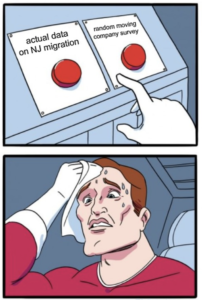Welcome to NJPP’s State of the State 2022: Rapid Reaction, your source for commentary and data analysis on Governor Murphy’s recent address. The transcript below was taken from NJPP’s Zoom room and has been lightly edited.
Lou (Louis Di Paolo, Communications Director): On Tuesday, Governor Phil Murphy delivered his fourth annual State of the State address where he highlighted policies enacted under his first term, reflected on the state’s ongoing response to the COVID-19 pandemic, and laid out some priorities for 2022.
A big theme in his remarks: The past four years proved that state government does not have to sacrifice low- and moderate-income families at the expense of economic growth — because the two go hand in hand.
But, before we get into the speech, does anyone want to share their thoughts on the post-election legislative session that just wrapped up?
Peter (Peter Chen, Senior Policy Analyst): Although this lame duck session cleaned up a number of leftover measures to help families, such as the expanded child care tax credit, there were plenty of missed opportunities for progress.
Lame duck sessions are rarely opportunities for major legislation. But this one was also full of rushed giveaways to corporate special interests (casinos, Hollywood studios) and politically-connected folks, while leaving out priorities crucial to the wellbeing of communities of color and people struggling to make ends meet.
Marleina (Marleina Ubel, Policy Analyst): Yes, and on top of those issues, there was an unprecedented lack of access and transparency to the process. The public couldn’t enter the State House, and the last session, which included a historic vote on abortion access, had technical glitches in the livestream that went unresolved for over an hour.
Lou: All great points, especially on process and transparency. That was a big theme of last year’s address and it’s clear we haven’t made much progress on that front.
What about the Reproductive Freedom Act? That was the biggest issue of lame duck and dominated news coverage of the session. Sheila, for those who may have missed the last-minute negotiations around the bill that ultimately passed (the Freedom of Reproductive Choice Act), what should our readers know?
Sheila (Sheila Reynertson, Senior Policy Analyst): For starters, this was *not* the Reproductive Freedom Act. What made it across the finish line on the last day of voting was the protection of abortion rights and administrative plans to look into how high deductibles and co-pays may block access to this time-sensitive care. While the declaration of rights is quite strong, the legislation ultimately left behind New Jersey’s undocumented immigrant community. It did nothing to expand access or advance equity in health care. So more work is vital to ensure the well-being and economic security of everyone facing an unplanned pregnancy.
Lou: Thanks, Sheila. That’s really important context. But let’s get to the speech. What were your takeaways?
Brittany (Brittany Holom-Trundy, Senior Policy Analyst): The first theme that dominated the speech was, of course, the COVID-19 pandemic, and rightfully so. After nearly two years, some people might find discussion of the pandemic to be tiring, but with the continuing waves of cases and hospitalizations — and the health, schooling, and other long-term challenges facing New Jersey families — it’s critical we keep our focus on supporting all New Jersey residents and working toward an equitable recovery.
Lou: If only there was a group that had a blueprint of policies to secure an equitable pandemic recovery. Oh, wait …
Sheila: Governor Murphy did a great job demonstrating that a robust response to the pandemic is in line with his policy goals of strengthening New Jersey. The public investments that supported New Jersey families during a global pandemic are also the building blocks of a strong state economy: affordable health care, housing, child care, and higher education; support for small businesses, green jobs, and mass transit.
Brittany: And even when he stepped up and then stepped away from the podium, Governor Murphy made a point to wear his mask — which, as an example of healthy practices, is a nice contrast to some other leaders we see daily on television.
Peter: That goes hand-in-hand with the Governor’s broader vision of a New Jersey that works together and helps each other succeed. When we hear questions like “when will the economy recover?” or “when will schools go back to normal?” they’re really asking “how can we slow and manage the pandemic itself?” We all have to do our part to control and manage the pandemic, and the mask is a strong symbol of that shared responsibility.
The state of our state is resilient and ready to keep moving forward.
Together, will continue to build a stronger and fairer New Jersey that works for every family – while continuing down the path of recovery from the pandemic.#NJSOTS pic.twitter.com/gT3rxod7uN
— Governor Phil Murphy (@GovMurphy) January 11, 2022
Lou: Property taxes were another big theme — any thoughts on that?
Jon (Jon Shure, Interim President): It wouldn’t be a New Jersey State of the State speech without a governor pledging to work to reduce property taxes. I was involved in Governor Florio’s final State of the State and it was all about property taxes.
Governor Murphy accurately observed that school funding is property tax relief, for example. The real solution has to involve equitably increasing broad-based state taxes (sales, income) and using some of the money to pay for local services — and schools — for which New Jersey relies much more on local property taxes than do other states.
As NJPP pointed out a while back, the state would have made a lot of progress toward that better balance had Gov. Tom Kean not declared the final bipartisan recommendations of the amusingly named SLERP (State and Local Expenditure & Revenue Policy) Commission to be dead on arrival, four months before they came out.
Lou: Now that’s a throwback. Thanks for providing some important historical context there, Jon.
What was everyone’s favorite part of the speech? Or were there any topics you were especially glad to hear mentioned?
Peter: My favorite part was the no new tax pledge for the upcoming budget year.
Lou: Didn’t realize we had Grover Norquist here in the chat.
Peter: But seriously, I thought the Governor’s speech did a good job of outlining the positive role state government plays in the lives of New Jerseyans, especially in light of the pandemic. Too often, rhetoric around “government” and “taxes” obscures what government really is — schools, hospitals, transportation, infrastructure, child care. The institutions that undergird society and support thriving communities need cheerleading, and the Governor provided it.
But to go back to my snarky answer above, strong public services require public investments, and that requires revenue. Changes in the tax code are a key tool to ensure the wealthiest pay their fair share to support the services we all benefit from.
Lou: So true. And it’s worth mentioning that state lawmakers still haven’t reversed some Christie-era tax cuts that primarily benefitted New Jersey’s wealthiest residents (looking at you, estate tax).
Sheila: Amen, Peter. I appreciated the eloquent way the Governor presented progressive taxation.
“The price for having an unlimited upside cannot be an unlimited downside. New Jersey will never move forward if we cling to the outdated and selfish notion of, ‘I got mine and the rest be damned.'”
That theme was woven throughout the speech — from his position on the pandemic response to the political process. It’s such an important tactic at a time of deep divisions and harsh health and economic disparities.
Marleina: I was happy to hear about the growing cannabis industry! Wait. Never mind. We are still talking about how great the cannabis industry will be. You know, when it happens.
Lou: Speaking of drug policy, he also mentioned the importance of harm reduction in the state’s response to the ongoing overdose crisis. As the folks at the New Jersey Harm Reduction Coalition pointed out on Twitter, this is probably the first time harm reduction was ever mentioned in a New Jersey State of the State.
Today @GovMurphy became the first New Jersey governor to mention harm reduction in the #NJSOTS address.
And these words are backed by action.@GovMurphy, thank you for investing in & supporting harm reduction. https://t.co/pQ87z0UBlu
— NJ Harm Reduction Coalition (@NJHarmReduction) January 11, 2022
Brittany: Yes! I love that the Governor has embraced harm reduction. It shows that we are building a state where everyone deserves access to needed care, without stigma, discrimination, or barriers. I’m also pleased that the importance of health and health care affordability remains a priority. We’ve learned so many lessons through the pandemic, and one that I hope will be a permanent change is this recognition that health for all New Jersey residents is key for a thriving state, now and in the future.
Lou: Did anything in the speech surprise you?
Marleina: Can I share one thing that didn’t surprise me? That New Jersey is growing! Both in terms of population and new jobs. New Jersey is a desirable place to be!
Jon: I know. Listening to the Governor extol the state’s advantages, I was thinking that if I didn’t live in New Jersey, I’d move here.
Peter: OK, but I saw some moving trucks leaving my neighborhood, so how can that be true?

Jon: I like that he attacked that bogus survey from a moving company that people still use to “prove” people are fleeing New Jersey. Here’s an interesting fact — the 3 states people move to most from New Jersey every year are New York, Pennsylvania, and Florida — and the top 3 states people move here from are — wait for it — New York, Pennsylvania, and Florida. There’s a lot of churning.
Lou: What was missing from the speech?
Sheila: The racial wealth gap in New Jersey. Reparations. Mental health crisis. Essential workers. The undocumented immigrant community. Educational and behavioral harm of virtual learning.
Peter: For a speech that mentioned criminal legal reforms, school funding, COVID-19, tax fairness, and environmental justice, there was no mention of the word “race” or “racism.”
The Governor mentioned Census data showing New Jersey’s growth since 2010. But that growth has also included increased racial and ethnic diversity. Without considering and combating the racial disparities in each of these issues, we run the risk of another unequal recovery. Even a quick glance at unemployment numbers show continued gaps in the recovery for different racial and ethnic groups.
Given the Governor’s commitment to policies that address racial justice, it was a bit disappointing that he excluded them from his address.
Marleina: I couldn’t agree more. This felt like the most glaring omission for me, along with the Excluded New Jerseyans Fund. Frontline workers are disproportionately women, immigrants (another word that was not in the speech), and people of color. It feels like they were left out, as the folks at Make the Road NJ were quick to point out on Twitter.
Immigrant women from across NJ call on @GovMurphy to fully fund #ExcludedNJ with $1 Billion.
As NJ returns to State of Emergency & starts 3rd pandemic year we cannot leave 100s of thousands of workers & families behind. @GovMurphy @SpeakerCoughlin @SenatorScutari #Recovery4All pic.twitter.com/GvDA3MOS4O
— Make the Road New Jersey 🦋 (@MaketheRoadNJ) January 11, 2022
Brittany: Absolutely, Marleina. As I mentioned earlier, I was very happy to hear health and health care affordability prioritized, but a narrow focus on affordability leaves out the fact that many residents are ineligible for coverage, even the affordable options being improved each year through NJ FamilyCare and GetCovered NJ.
So, in addition to cost growth control and affordability, I would have loved to have heard more about implementation of Cover All Kids, plans for opening up options for undocumented adults, as well as a commitment to addressing barriers to care for reproductive health — particularly abortion — that was left out of the recently passed, pared-down reproductive health act as Sheila mentioned earlier.
Jon: All true. But this was just the first in a trifecta of speeches Governor Murphy will deliver over the next couple months, the others being his inaugural address and the speech outlining the budget he’ll purpose for the fiscal year that starts July 1. My fingers are crossed that he held back some good stuff for those occasions.
Lou: Sounds like a lot of unfinished business for the new legislative session and Governor Murphy’s second term. What’s everyone looking forward to accomplishing in term two? And yes, this is an opportunity to once again plug the policies in our Blueprint…
Marleina: I am looking forward to shrinking the number of people incarcerated in this state. The pandemic showed us that decarceration is possible and can happen quickly. I am excited to see that work continue.
Also, I hope to see real reform in criminal justice and policing. There is a lot of work to do and there are bills waiting to be signed that could really move us toward a more transparent and accountable system.
Peter: Given the Governor’s focus on affordability for working families, I’m hoping to see an ambitious agenda of tax credits and supports, such as a state-level child tax credit and a more expanded state earned income tax credit for New Jerseyans paid too little to get by, especially in this difficult time. To make life more affordable, as he promises, we’ll need strong public investment on behalf of New Jersey’s low- and moderate-income families.
Brittany: Agreed. Along those lines, I want to see significant TANF reforms so we can finally bring that program into the 21st century and move it away from its racist roots. And in addition to things I mentioned before, I’m looking forward to actions that will help all New Jerseyans get quality health care. So I’ll be following things the Governor’s mentioned in the State of the State like analyzing prescription drug costs, which could include creating the Prescription Drug Affordability Board. Passing and establishing an Easy Enrollment program (which he conditionally vetoed this legislative session) too would help get more New Jerseyans insured.
Availability, affordability, accessibility, quality — there are plenty of issues for the Gov’s team to pursue in term two!
Sheila: I appreciate the idea of tending to the policies of the first term to ensure their longevity. That being said, there is room in his second term for more tax reform, especially when it comes to taxation of inherited wealth. The amount of foregone revenue that is instead flowing into the pocketbooks of a few thousand very wealthy families every year is a policy failure, plain and simple. The Governor has made it clear that taxation based on ability to pay (unlike the local property tax) “open[s] opportunities for more New Jerseyans to gain the tools they need to have their own prosperous future.”
Lou: Amazing. Thanks, team! Any final thoughts?
Peter: Next time we do this we need more memes.
Lou: Noted. We’ll make that a priority next time we do this. Go, team!






